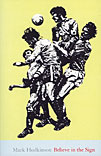 by Mark Hodkinson
by Mark Hodkinson
Pomona, £9.99
Reviewed by Harry Pearson
From WSC 242 Apr 07
Mark Hodkinson’s funny and poignant new book is a deftly written account of coming of age in a scruffy north-of-England town, Rochdale – “built to be rained upon or swathed in mist, joyous in a sulk” – in which football plays its part, not in any particularly pivotal way but simply as part of the fabric of growing up.
The accounts of pointlessly dangerous games, the advent of karate classes and CB radio, and the apparently inexorable collapse of the British economy (at least as far as it affected the corner shop and local factories) will stir long-forgotten memories even in those of us who spend far too much time wallowing in childhood nostalgia. The casual way boyhood friendships are formed and then broken, for instance, is beautifully evoked. One minute a contemporary is practically living in your house and the next you are barely speaking to him.
Hodkinson is equally good when writing about Rochdale FC, a club apparently teetering permanently on the edge of oblivion, weighed down by debt, underachievement and the fact that their most famous fan was gargantuan Liberal MP Cyril Smith. Hodkinson begins going to Spotland more or less because it is there, in the company of his dad (a figure brought to life in a series of slightly elliptical scenes in which the reader feels he is watching events from the corner of his eye) and gradually the visits become a habit despite the woeful football and the ever-present threat of bootboy violence.
Despite the obvious limitations of Dale’s players – less noticeable, admittedly, in the days before blanket TV coverage when it was quite possible to believe that, say, Joe Laidlaw was the equal in talent and skill of Eusebio for want of contradictory evidence – he comes to hero-worship a number of them. This leads to one of the best and funniest sections of the book as Hodkinson takes to writing to players.
Corresponding with sports stars was something that went on a lot back then (a friend of mine had a long pen friendship with Alan Knott, the England wicketkeeper, and for several years his winters were enlivened by the arrival of postcards from India, the Caribbean or wherever else the MCC happened to be on tour). But while the author’s mate exchanges letters with Peter Shilton and receives souvenir packs from Borussia Mönchengladbach and Honved through the post, Hodkinson concentrates on striking up correspondence with “hob-nail tin bath footballers – Fred Binney, Tommy Tynan, Alan Young…”
Letters to Hodkinson’s particular idol, the bustling centre-forward Bob Mountford, once of Rochdale but by then bumping about in West Yorkshire, produce a slow but steady response. In his first letter Mountford confesses that his decision to leave Rochdale for Huddersfield was based on the fact that “Huddersfield is quite a fashionable club”, names his favourite player as Bob Latchford and his favourite ground as Stoke City. The contents are of less interest, however, than the handwriting which is “surprisingly neat” – possibly because a girlfriend had penned the letter on his behalf.
The correspondence ends abruptly, however, when Mountford surprisingly turns up at Spotland one night and, against all odds, sits down right next to Hodkinson. The teenager is overcome with shame and embarrassment. “When we attacked the goal to our left, which was where he was sitting, I watched without moving my head so there was no possibility that our eyes would meet.” He does this because: “I didn’t want Mountford – a brave, skilful footballer and with the decency to write to strangers – to see the real me.”
A real pleasure to read.